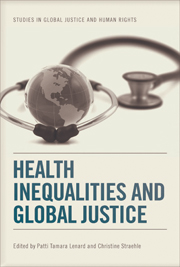Book contents
- Frontmatter
- Contents
- Acknowledgements
- Notes on the Contributors
- Introduction: Health Inequality and Global Redistributive Justice
- Part 1 A Right to Equal Health?
- 1 Is there a Human Right to Health?
- 2 What's Wrong with Global Health Inequalities?
- 3 Ecological Subjects, ‘Ethical Place-making’ and Global Health Equity
- 4 Health Inequalities, Capabilities and Global Justice
- Part 2 Who is Responsible for Remedying Global Health Inequality?
- Part 3 Measuring Health and Health Outcomes
- Part 4 Borders and Health
- Bibliography
- Index
1 - Is there a Human Right to Health?
from Part 1 - A Right to Equal Health?
Published online by Cambridge University Press: 05 August 2013
- Frontmatter
- Contents
- Acknowledgements
- Notes on the Contributors
- Introduction: Health Inequality and Global Redistributive Justice
- Part 1 A Right to Equal Health?
- 1 Is there a Human Right to Health?
- 2 What's Wrong with Global Health Inequalities?
- 3 Ecological Subjects, ‘Ethical Place-making’ and Global Health Equity
- 4 Health Inequalities, Capabilities and Global Justice
- Part 2 Who is Responsible for Remedying Global Health Inequality?
- Part 3 Measuring Health and Health Outcomes
- Part 4 Borders and Health
- Bibliography
- Index
Summary
The International Covenant on Economic, Social and Cultural Rights (ICESCR) proclaims a universal human right to health, in Article 12, which reads:
The States Parties to the present Covenant recognize the right of everyone to the enjoyment of the highest attainable standard of physical and mental health.
Let us briefly note some features of this right. First, this is a positive right that requires positive action on the part of corresponding duty bearers; the legal duties to fulfil this right fall primarily on one's state. Second, this is a right to the enjoyment of health, rather than a right to goods or services (such as healthcare) that would enable one to have a healthy life. In other words, it is a right to a certain outcome in terms of health and not merely to the opportunity for health. Third, it is a right to the highest attainable standard rather than an adequate or sufficient level of health. However, the highest attainable standard is normally interpreted in a rather conservative fashion, in the sense that it refers to the highest standard achievable in a specific country, given its resource limitations. This means that not all right-holders everywhere are entitled to the same level of health.
- Type
- Chapter
- Information
- Health Inequalities and Global Justice , pp. 17 - 33Publisher: Edinburgh University PressPrint publication year: 2012



